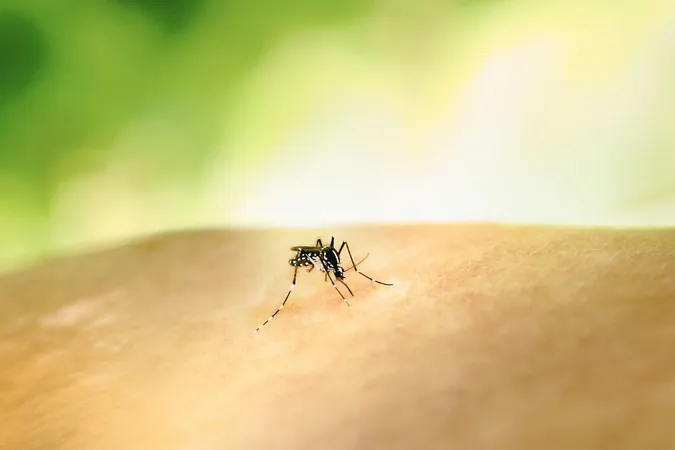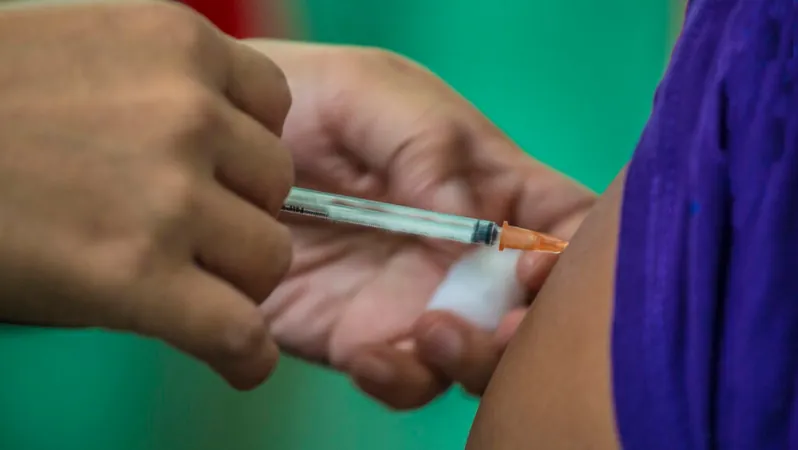
The World Faces an Unprecedented Dengue Fever Crisis: Here's What You Need to Know!
2024-11-08
Author: Mei
Dengue Fever Cases on the Rise
Dengue fever cases have skyrocketed globally, with numbers doubling between 2023 and 2024. The World Health Organization (WHO) reports over 12.7 million cases and nearly 8,800 deaths in just nine months of 2024 alone. This alarming outbreak has put many communities at risk, particularly in the Americas, where Brazil, Argentina, Mexico, Paraguay, and Colombia are experiencing the highest case loads.
Behind the Surge
So, what’s behind this surge? The primary culprits are two types of mosquitoes: Aedes aegypti and Aedes albopictus, commonly known as the tiger mosquito. These species thrive in warmer, wetter weather, conditions exacerbated by climate change. As global temperatures rise, their habitat expands, allowing them to breed more easily. Interestingly, this adaptability includes the ability to survive frost, further extending their reach into previously colder regions.
Cyclical Nature of Outbreaks
The outbreak is not just an isolated incident; dengue fever is cyclical, with large increases in cases occurring periodically. Urbanization plays a significant role too. As cities expand—often without proper planning—humans encroach on mosquito habitats, creating a perfect breeding ground for outbreaks. Meanwhile, increased international travel sees the virus spread further afield, reaching areas where dengue was once rare.
Impact in the Americas
The Pan American Health Organization has reported staggering increases in cases, with a 209% rise in the Americas compared to just last year and a whopping 387% rise against the five-year average. Brazil has been particularly hard hit. The El Niño phenomenon has brought prolonged periods of heat and rainfall, creating a breeding paradise for mosquitoes. For the first time, all four serotypes of dengue are circulating in the country, amplifying the danger.
Global Spread
But it isn't just the Americas that are feeling the effects. The European Centre for Disease Prevention and Control has noted a doubling of dengue cases in countries like France, Spain, and Italy since last year. As the virus continues to push into new territories, the WHO has called for immediate coordinated global responses.
Combating the Outbreak
So, what can be done to combat this fast-spreading virus? The WHO's recently launched global strategic plan outlines a multifaceted approach to tackle the outbreak head-on. Key components include enhancing emergency coordination among health leaders, collaborative surveillance efforts for early detection, and active community engagement to ensure local populations understand prevention measures.
Vaccine Research
Additionally, research into dengue vaccines is progressing rapidly. While the first vaccine, Dengvaxia, came onto the market in 2015, it requires careful screening for recipients. Newer vaccines like Qdenga are showing promise with higher efficacy rates. However, broader vaccination efforts will be vital to curtail the outbreak.
Community Action
Communities are also encouraged to take action; proper waste management and maintaining clean water storage areas can significantly reduce mosquito breeding sites. Individuals are urged to protect themselves by wearing suitable clothing, using insect repellents, and deploying mosquito nets in high-risk zones.
The Need for Immediate Action
As we face this global health crisis, it’s clear that our interconnected world makes us all vulnerable to outbreaks exacerbated by climate change and urbanization. This situation highlights the urgent need for international cooperation, public health initiatives, and environmental management to ensure that we can not only respond to current threats but also fortify our defenses against future outbreaks.
Conclusion
So, as dengue fever spreads rapidly across the globe, one thing is certain: without immediate and united action, the situation could worsen dramatically. Let’s not wait until it's too late—act now to safeguard our communities and global health!




 Brasil (PT)
Brasil (PT)
 Canada (EN)
Canada (EN)
 Chile (ES)
Chile (ES)
 Česko (CS)
Česko (CS)
 대한민국 (KO)
대한민국 (KO)
 España (ES)
España (ES)
 France (FR)
France (FR)
 Hong Kong (EN)
Hong Kong (EN)
 Italia (IT)
Italia (IT)
 日本 (JA)
日本 (JA)
 Magyarország (HU)
Magyarország (HU)
 Norge (NO)
Norge (NO)
 Polska (PL)
Polska (PL)
 Schweiz (DE)
Schweiz (DE)
 Singapore (EN)
Singapore (EN)
 Sverige (SV)
Sverige (SV)
 Suomi (FI)
Suomi (FI)
 Türkiye (TR)
Türkiye (TR)
 الإمارات العربية المتحدة (AR)
الإمارات العربية المتحدة (AR)